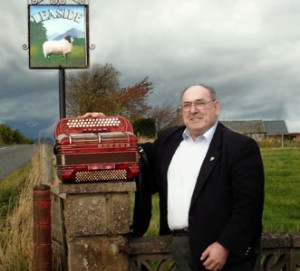 Bill Black is one of Scottish Country Dance Music’s most popular bandleaders. A consummate professional who has only once been late for an engagement – by ten minutes – in over sixty years, Bill is an all-round talent, playing button accordion and fiddle and composing dozens of tunes.
Bill Black is one of Scottish Country Dance Music’s most popular bandleaders. A consummate professional who has only once been late for an engagement – by ten minutes – in over sixty years, Bill is an all-round talent, playing button accordion and fiddle and composing dozens of tunes.
Born on a farm at Muthill, near Crieff, on February 7, 1935, Bill comes from a family that had no musical background until, aged seven, Bill came into contact with a musical instrument for the first time. Showing an interest in the melodeon a visiting neighbour had brought along, Bill was allowed to try it out. He disappeared into the backroom and within half an hour had mastered his first tune. The neighbour, impressed, made a present of the melodeon and Bill began to practise, picking up tunes from his parents’ 78s and from the radio.
Looking to encourage this talent, Bill’s father sent him to a teacher in Callander. When Bill came home after the first lesson and was asked what he’d learned, he said, “Nothing.” After telling Bill to show him what he could play, the teacher had spent the entire lesson getting Bill to teach him the tunes he knew. When the same thing happened on the second lesson, Bill decided just to teach himself.
He played his first public engagement at the age of thirteen in Strathyre Village Hall, with a PA system improvised out of old radio speakers, and his first paid gig followed three years later – as a fiddler rather than an accordionist. The fiddle he was playing cost only a shilling more than Bill’s first melodeon after his father went to a sale looking for a wardrobe and returned with this bargain instead.
By this time, Bill had left school and followed his father into farm work, working as a shepherd and, presently, head shepherd under his father on the Ancaster Estates and playing for dances at weekends. He formed his first band in 1962 and shortly afterwards made the first of many radio broadcasts, despite failing his first audition for the BBC. The audition had coincided with a change of producer, the incoming producer over-ruled his predecessor’s decision and Bill still hasn’t passed an audition.
Records followed, the Sound of the Perthshire Glens being the first of sixteen albums, as did a book of tunes, The Leaside Collection, and the Bill Black Band was now firmly established on the circuit at home as well as going on to play regularly in Ireland and travelling as far afield as Copenhagen and the Nigerian capital, Lagos. In 1971, Bill became the Scottish Accordion Champion, a success that he followed with consecutive wins in the Scottish Trio Championships between 1974 and 1976.
Moving from shepherding into sales and on to his own successful animal health business, with shops in Aberfeldy, Oban and Inverness, Bill continued to delight audiences and even after he lost his right index finger in an accident in 2006, he was able to re-learn the accordion as well as maintain the Bill Black Band’s tradition of twin fiddle features.
Being from a family with no known musical heritage, Bill is especially proud that his children, Kathleen, a pianist and singer, and sons Robert and Duncan, both Scottish Accordion Champions and professional musicians, have inherited the musical gene. His career, he says, has been one long highlight, guided by the Bill Black principle: turn up on time, look your best and always remember to smile onstage.
Scottish Traditional Music Hall of Fame is run by
Hands Up for Trad.